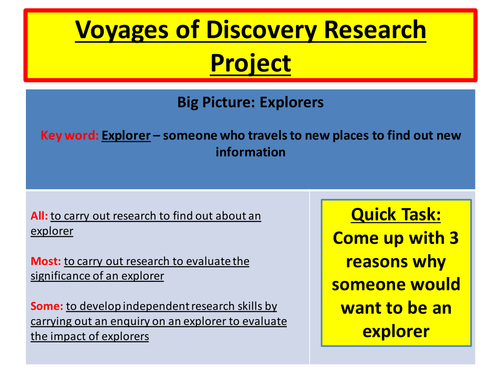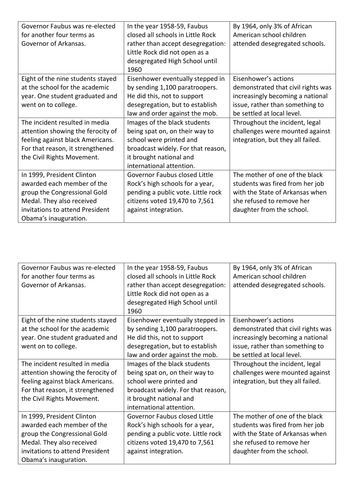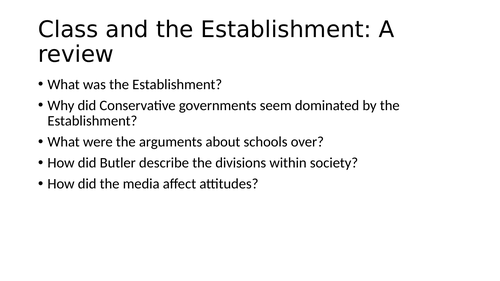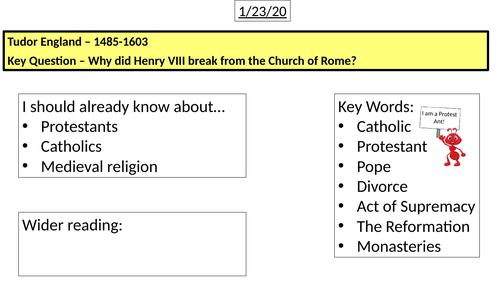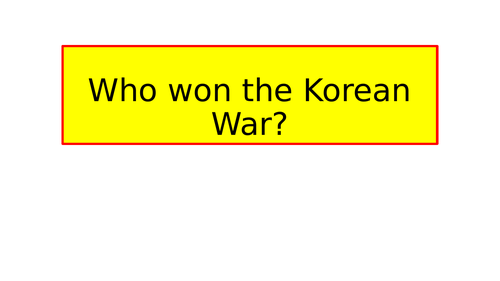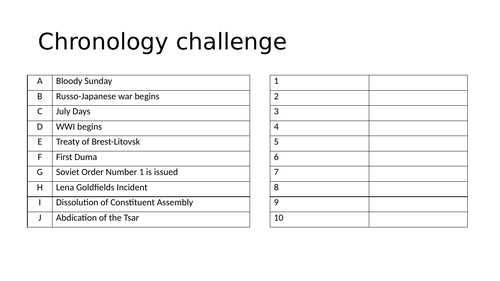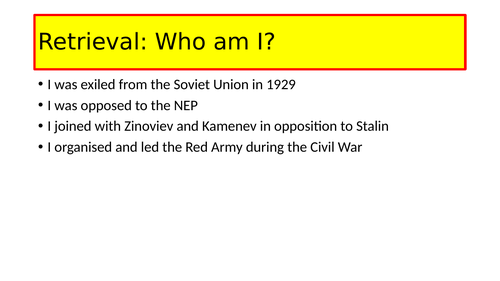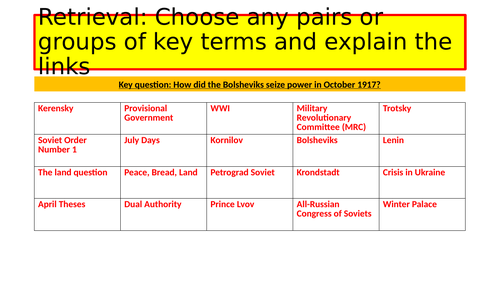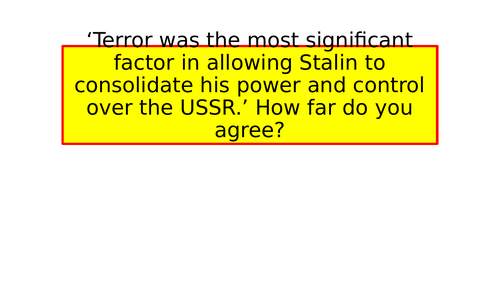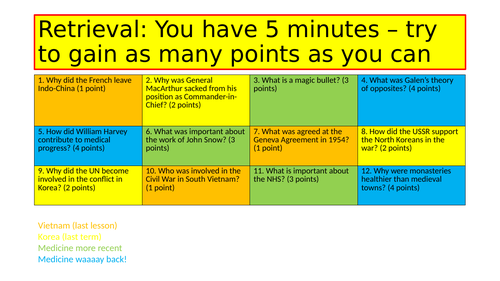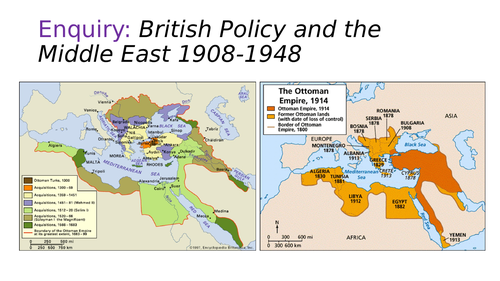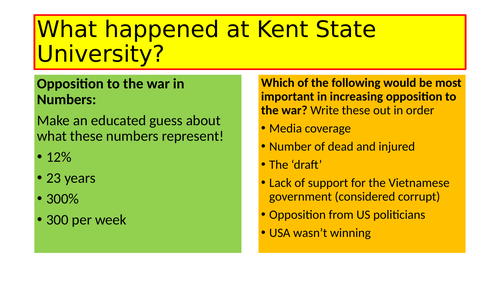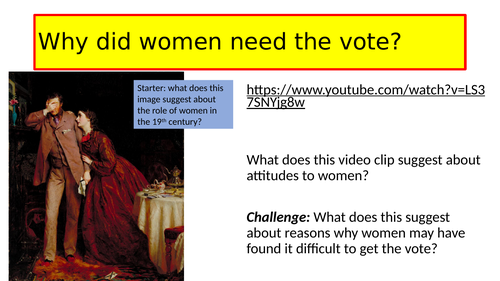
170Uploads
39k+Views
18k+Downloads
All resources

Explorers research task - 4 lesson series
A differentiated research task, ideal for ks3 students to promote independent learning. Students are given clear guidance as to what to include in their project, which can be peer or self assessed at the end. The research task is broken down so that students know what they need to have achieved in each lesson.

Civil Rights Movement - Consequences of Little Rock
A follow up lesson in which students examine the consequences of Little Rock and therefore its significance for the Civil Rights Movement. This lesson will also act as a summary in which students consider the progress made by the CRM by the end of the 1950s.

AQA 7142 Making of Modern Britain - Women 1950s
An A-level lesson in which students examine the extent to which the lives of women were changed during the 1950s. Students will analyse the extent to which lives have changed for women economically and socially.

Making of Modern Britain - Conservative fall 1964
An A-level lesson in which students examine the causes of the Conservative fall from power in 1964. Students will work in groups to evaluate the relative significance of a range of factors before reaching their overall judgement.

Russia - 1905 Revoultion
An A-level lesson in which students examine the events of 1905. Students will create a living graph to show the anger felt by Russians, along with the level of threat posed to the Tsar. Students will examine evidence to conclude whether the events of 1905 deserve to be known as a revolution or not.

Russia 1894-1941: problem of Reform
An A-level lesson in which students must analyse the barriers to reform in Russia at the beginning of Tsar Nicholas II’s rule. Students will describe, explain and evaluate the significance of the barriers to reform to understand why little progress was made. This will form the foundation for understanding why there was significant opposition to Nicholas II. Students will ultimately reach a judgement on how well Nicholas was suited for the job, and the extent to which he can be blamed for the issues facing Russia.

AQA 8145 Medicine - Medieval Doctors
A GCSE lesson in which students will compare the effectiveness of different types of doctors who were available during the Medieval period. Students make the comparisons by completing top trumps cards for apothecaries, barber surgeons, physicians and wise women and evaluate their training, available treatments and cost. Students will also match up the Medieval patient with the most appropriate doctor to demonstrate understanding of the different roles that they played.

The Reformation - Why did Henry break from Rome?
A KS3 lesson which includes practice of a GCSE style question. Students will need to have knowledge of the Break from Rome and will build on their knowledge to produce a written answer. Students will produce sequence events to show the connections to be able to explain the Reformation. All resources needed are included in the PowerPoint.

UN involvement in Korean War
A GCSE resource for the conflict and tension in Asia unit. Students will understand the reasons for UN involvement, and analyse the role of the USA in the process. Students will apply their understanding of the causes so far to reach a judgement on the country/organisation most responsible for the outbreak of war.

How did the Korean War end in Stalemate?
A GCSE lesson in which students will understand how the Korean War ended in a stalemate. Students will use a skim read task to understand the events, before applying their understanding to an explanation task in which students must explain how one event caused the next. In doing so, students work towards a ‘write an account’ style question on the events of the Korean War. Students will finish with a judgement about why the Korean War ended in stalemate by deciding on which statement they agree with most. Suited for AQA Conflict and Tension in Asia specification.

Who won the Korean War?
A GCSE lesson in which students analyse and evaluate the impact of the Korean War. Students will compare the gains and losses of the countries and organisations involved in the war. This leads to an exam practice question on the 16 mark essay in which students must decide who won and lost.

Russia - Civil War and Bolshevik victory
A lesson in which students analyse the reasons for Bolshevik victory in the Civil War. Students will sort evidence in to two main categories: red strengths and white weaknesses, before categorising further in to factors. Students will use these factors to help them to create links between the factors in a linking lines activity. Students will finish by considering whether they think the outcome of the Civil War was a foregone conclusion.

Russia - Purges
An A-level lesson in which students will explain, evaluate and analyse the effectiveness of Stalin’s purges. Students will consider the post-Kirov purges, purges of party, army and people and will complete a chart in which they use the necessary skills for effective essay writing by adding their analysis and evaluation of each different purge. Students will be able to draw conclusions about the importance and effectiveness of the purges for Stalin’s consolidation of power.

Fan 'n' pick - Lenin's Russia
A set of Fan ‘n’ pick cards which cover the course content for A-level students on the topic of Lenin’s rule. Also included is a data capture sheet for students to pre-assess their level of knowledge on the different topics such as war communism and the NEP. This has worked effectively as a revision tool, or retrieval tasks.

Russia - Second Five Year Plan
An A-level lesson in which students will compare the successes of the First and Second FYPs. The lesson is based on students having already studied the first FYP. Includes paired work in which students construct lists of similarities and differences, and group work in which students interrogate statements about the relative successes of the plans and must reach an informed and substantiated judgement.

Russia - Stalin's consolidation of power (summary)
An A-level lesson to prepare students for writing an essay on how Stalin consolidated his power in the Soviet Union. Students will categorise information which clearly demonstrates the links between the different methods Stalin used to strengthen his position. Students will use the precise evidence offered to help them to reach judgements on statements about the importance of different methods in order to guide them towards making strong arguments in their essays which link the factors together.

Vietcong - how effective?
A lesson on the effectiveness of the Vietcong when fighting in the Civil War which broke out between North and South Vietnam. Students will gather evidence on four key areas: aims, support, tactics and supplies to understand how effective they were, and then practice adding their explanations as to why this would help the Vietcong. Students will finish by reaching a judgement on which area was the most important in helping them to fight effectively.

Middle East - British policy WWI
Two lessons on British policy in WWI. Focus of the lesson is on the depth study on British policy. Students will understand the competing claims to Palestine and the impact of British promises made during WWI to the different groups. Students will also begin to consider the motivations behind British policy in this area and the consequences and problems of these.

Kent State and the media (Cold War in Asia)
A GCSE lesson on the Cold War in Asia. This lesson focuses on the impact of the events at Kent State University, and links to the impact of the media on public opinion in the USA.
Students will carry out a source investigation to work out what happened at Kent State university, and use a video clip to support. To draw this together, students will consider a range of factors influencing public opinion in the US, and will make links between these factors. This will set students up for planning of a write an account question where students will write a ‘step by step’ guide with a focus on chronology and links, as per the requiremetns for 8 mark write an account questions. It concludes with some summary questions using numbered heads for students to reach judgements.

Why did women need the vote?
A lesson designed as an introduction to the suffragettes. Students will consider the problems facing women in the areas of attitudes, education, work and rights, and will gather evidence about these issues. Students will consider how the vote may improve women’s lives in these areas and will reach judgements about the biggest problems facing women in the 19th century. Finally, students will choose from one of two tasks which will require students to apply their understanding of both the problems women faced, and also the reasons why women wanted the vote.

